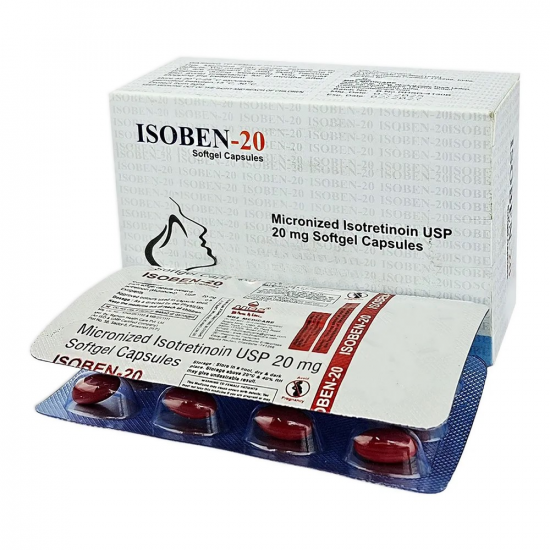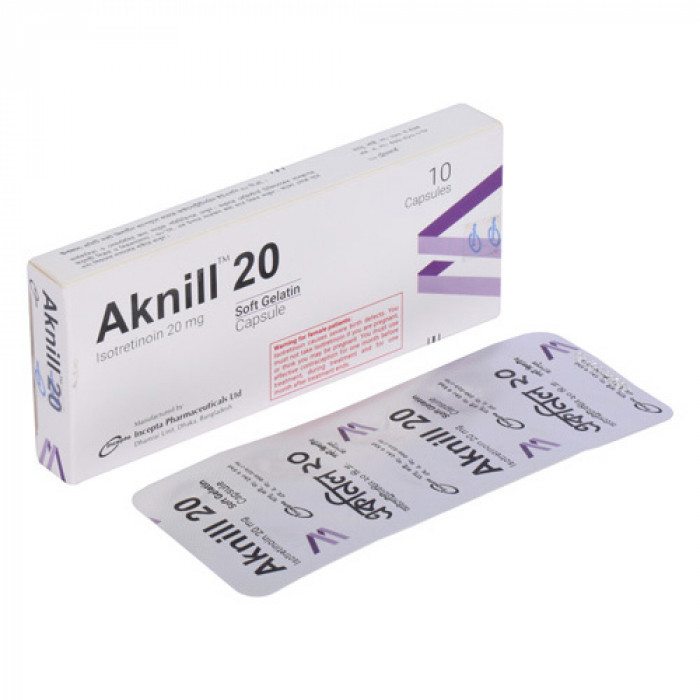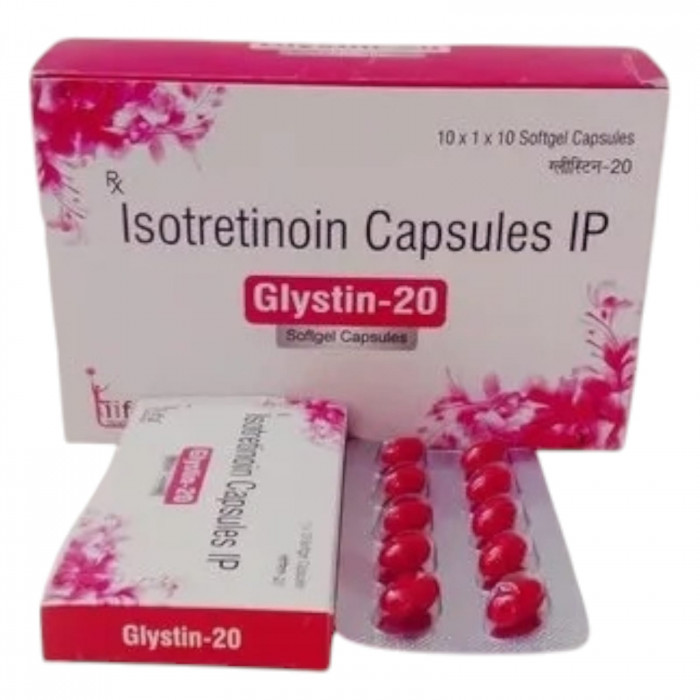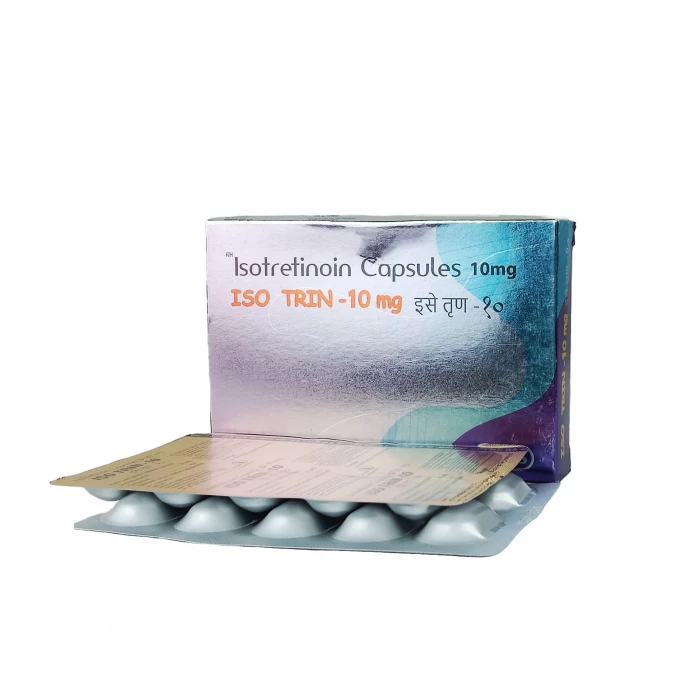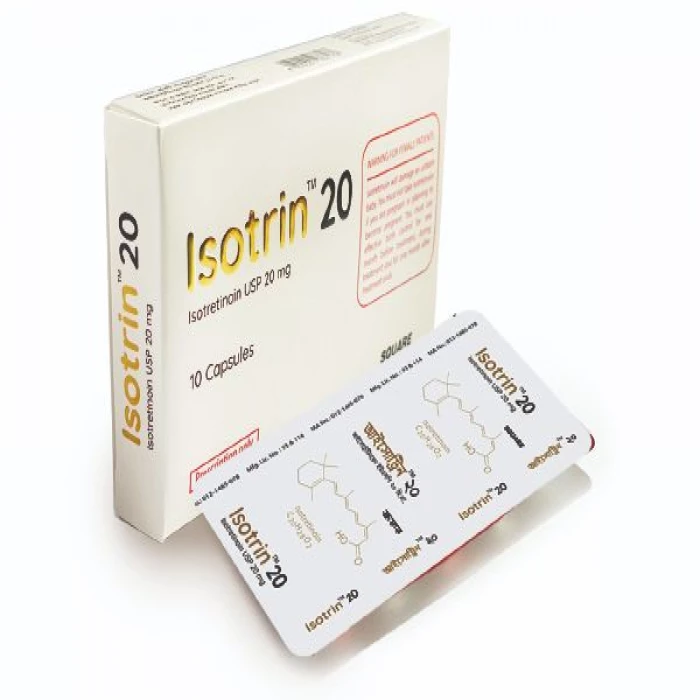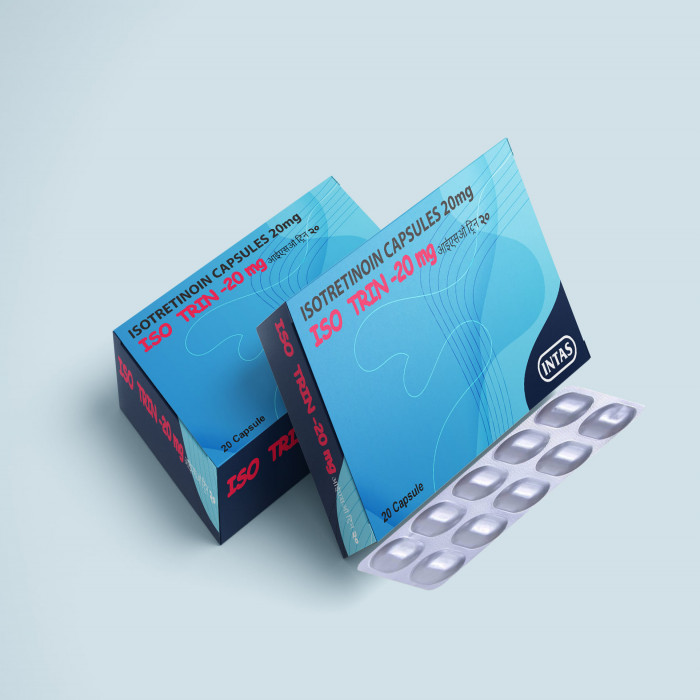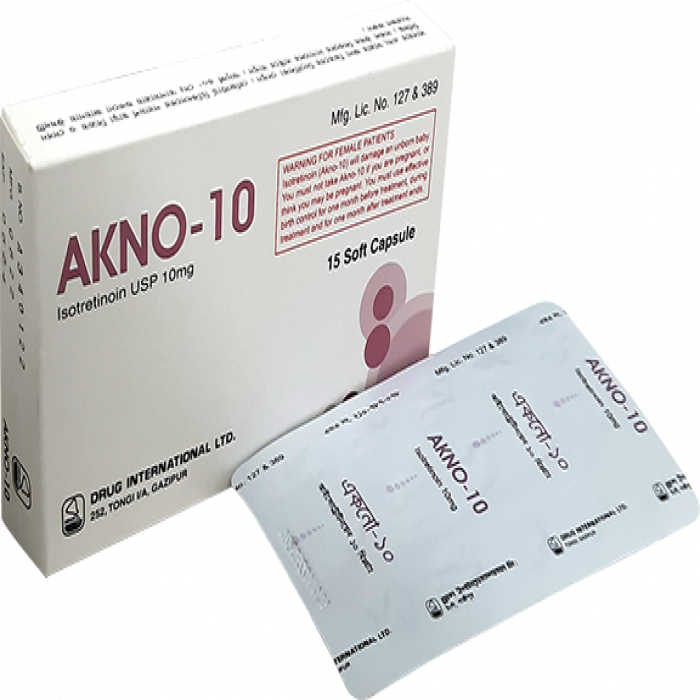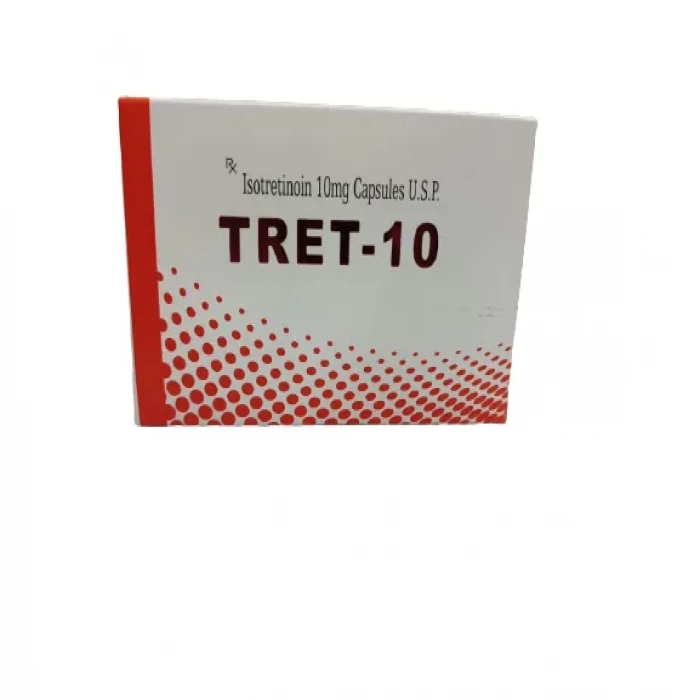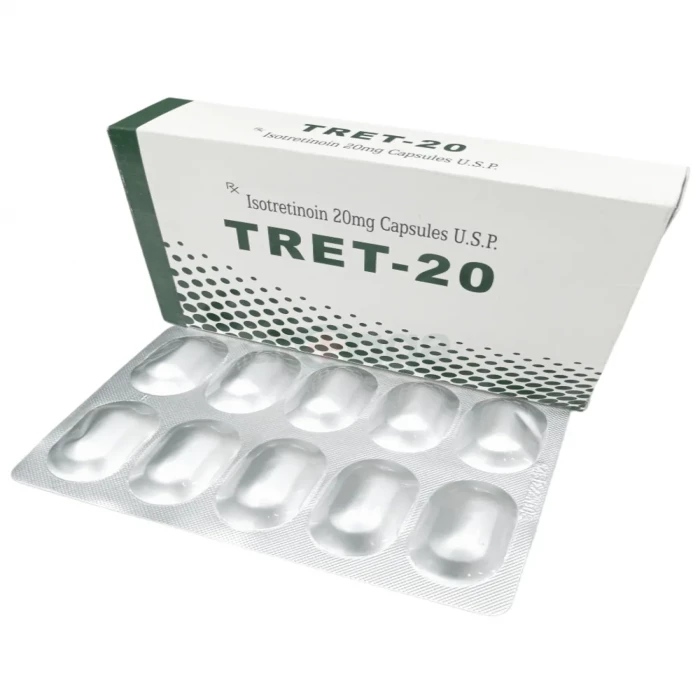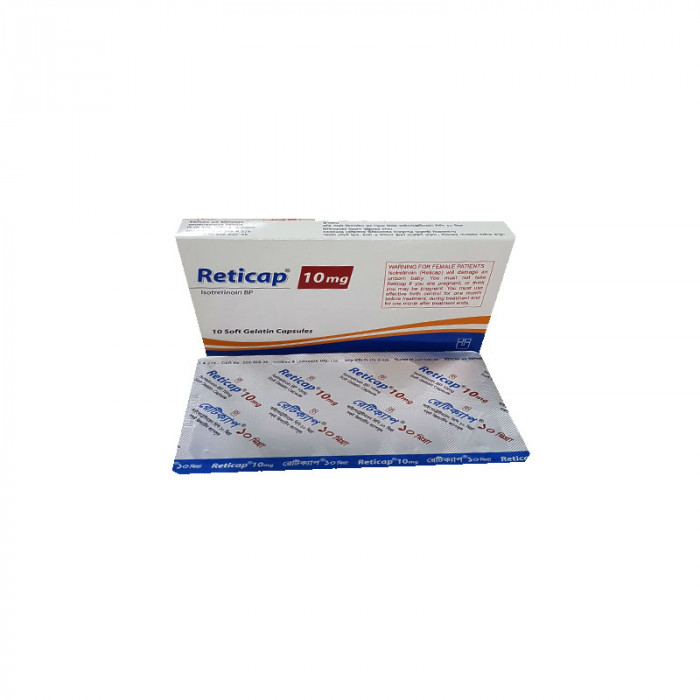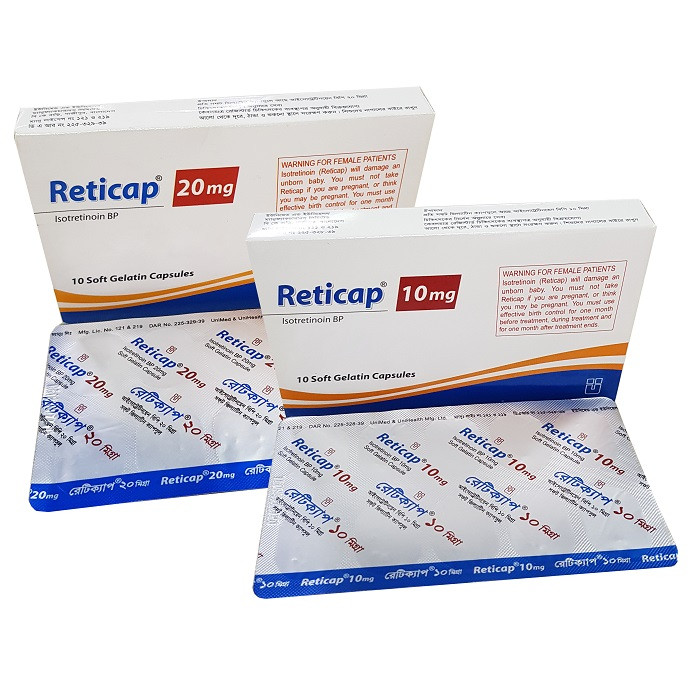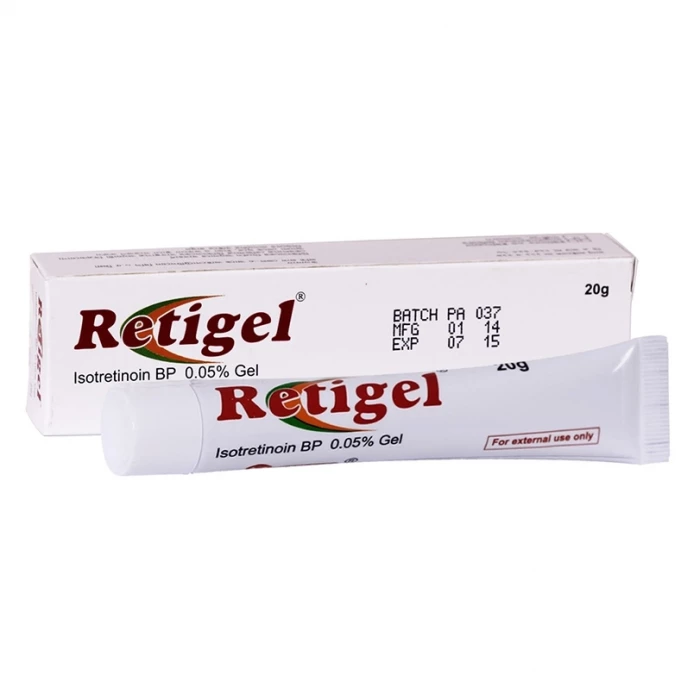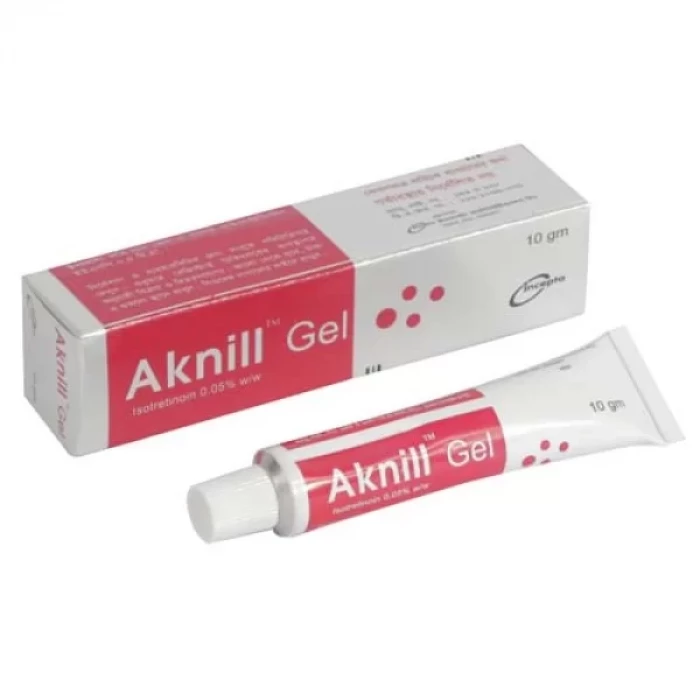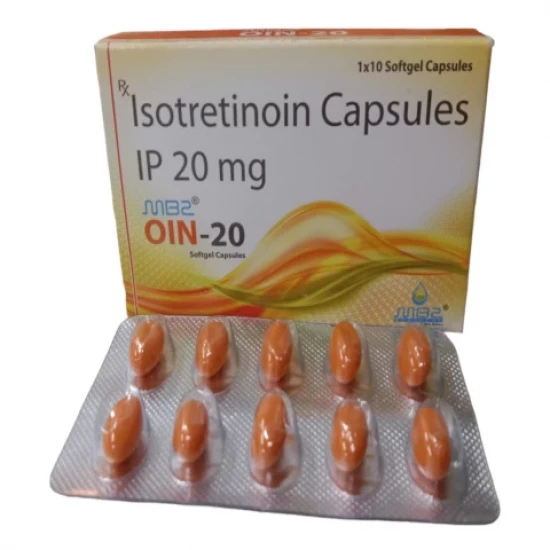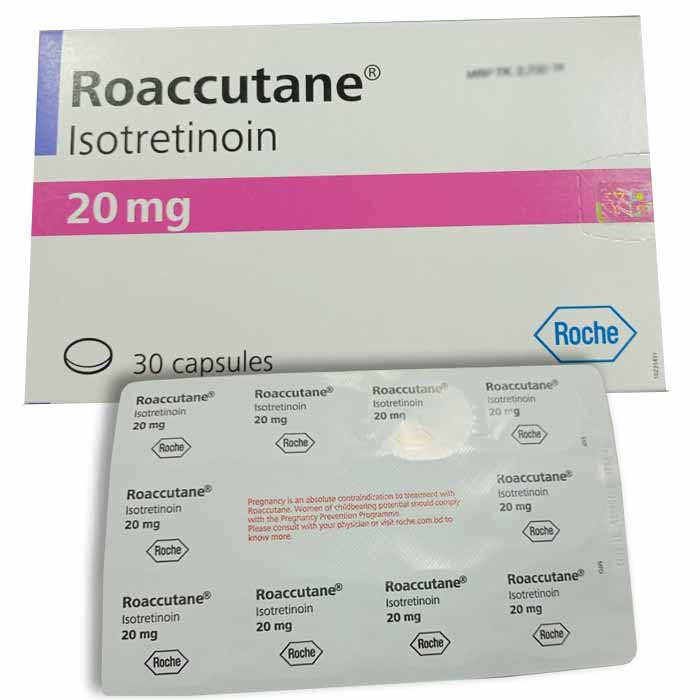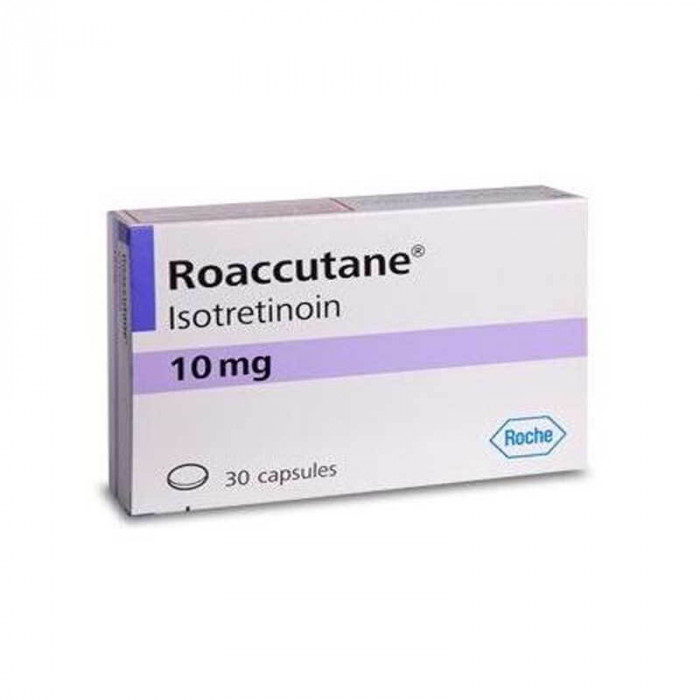
✔ 100% Authentic Product
👁️ Currently Viewing 8547
Roaccutane 10mg Capsule
Roaccutane 10mg Capsule (Isotretinoin) is a form of vitamin A and anti-acne medication, which is used for treating skin conditions like acne.
Discount
Price: ৳ 954
MRP:
৳
973.52
2%
Off

100% Genuine Products, Guaranteed

Safe & Secure Payments, Always

Fast, Secure & Efficient Delivery

Proper Packaging
 Cash on Delivery - All over Bangladesh
Cash on Delivery - All over Bangladesh Regular Delivery - 12-24 Hours, Dhaka City* Charge Tk.39-59
Regular Delivery - 12-24 Hours, Dhaka City* Charge Tk.39-59 Regular Delivery - 24-48 Hours, Other Cities* Charge Tk.99-110
Regular Delivery - 24-48 Hours, Other Cities* Charge Tk.99-110
🌙 রমযান অফার 🌙
 ফ্রি ডেলিভারিঃ - ৭৯৯ টাকা+ অর্ডারে, ঢাকা
শহরে
ফ্রি ডেলিভারিঃ - ৭৯৯ টাকা+ অর্ডারে, ঢাকা
শহরে ফ্রি ডেলিভারিঃ - ২৭৯৯ টাকা+ অর্ডারে, ঢাকার
বাহিরে
ফ্রি ডেলিভারিঃ - ২৭৯৯ টাকা+ অর্ডারে, ঢাকার
বাহিরে
📲 মোবাইল অ্যাপ অর্ডারে সাশ্রয় বেশী
-
Google Play Store থেকে ডাউনলোড
-
Apple Store থেকে ডাউনলোড
100% Genuine Products, Guaranteed
Safe & Secure Payments, Always
Fast, Secure & Efficient Delivery
Proper Packaging
 Cash on Delivery - All over Bangladesh
Cash on Delivery - All over Bangladesh Regular Delivery - 12-24 Hours, Dhaka City* Charge Tk.39-59
Regular Delivery - 12-24 Hours, Dhaka City* Charge Tk.39-59 Regular Delivery - 24-48 Hours, Other Cities* Charge Tk.99-110
Regular Delivery - 24-48 Hours, Other Cities* Charge Tk.99-110 ফ্রি ডেলিভারিঃ - ৭৯৯ টাকা+ অর্ডারে, ঢাকা
শহরে
ফ্রি ডেলিভারিঃ - ৭৯৯ টাকা+ অর্ডারে, ঢাকা
শহরে ফ্রি ডেলিভারিঃ - ২৭৯৯ টাকা+ অর্ডারে, ঢাকার
বাহিরে
ফ্রি ডেলিভারিঃ - ২৭৯৯ টাকা+ অর্ডারে, ঢাকার
বাহিরে- Google Play Store থেকে ডাউনলোড
- Apple Store থেকে ডাউনলোড
🌙 রমযান অফার 🌙
📲 মোবাইল অ্যাপ অর্ডারে সাশ্রয় বেশী
✅ Description:
- Roaccutane 10mg Capsule contains Isotretinoin, which is a Retinoid medication used to treat severe forms of acne in adults and children above 12 years of age. These forms of acne include nodular acne, conglobate acne, and acne that may result in permanent scarring. Acne is a skin condition characterized by inflamed spots, oily skin, and painful nodular lesions on the face, back, and chest.
- During treatment with Roaccutane 10mg Capsule, your doctor may conduct blood tests and pregnancy tests while monitoring your progress. It is important to consult a dermatologist during this time. You may be advised to reduce intense exercise and physical activity. It is recommended to use sunscreen with a high protection factor (SPF 15 or higher) before sun exposure.
- Avoid excessive sun exposure and the use of sunlamps or tanning beds. Consumption of alcohol should be avoided while taking Roaccutane 10mg Capsule due to potential side effects. Additionally, blood donation should be avoided both during and after stopping the medication for at least one month. Cosmetic procedures should also be avoided while taking Roaccutane 10mg Capsule or for at least six months after discontinuing it.
- Roaccutane 10mg Capsule is not recommended for use in patients with liver or kidney disease, high blood lipid levels, or high levels of Vitamin A. Caution should be exercised in patients with a history of mental illness or a family history of mental illness, as well as in patients with asthma, diabetes, heart or bone problems (e.g., osteoporosis), or eating disorders.
- Pregnant women, women planning a pregnancy, breastfeeding women, and children below 12 years of age should not use Roaccutane 10mg Capsule. It is advisable to consult a doctor for advice in such cases. Elderly patients (65 years and older) should use Roaccutane 10mg Capsule with caution.
- Roaccutane 10mg Capsule may cause certain side effects such as dry skin on the face and lips, joint or muscle pain, headaches, easy bruising or bleeding, weakness, etc. If any of these symptoms worsen, it is important to consult your doctor. Additionally, some patients may experience depression, psychosis, suicidal thoughts, or thoughts of self-harm while taking the medication. If you experience any of these behaviors or thoughts, consult your doctor.
Safety Advices

Alcohol
UNSAFE
Avoid consumption of alcohol while taking Roaccutane 10mg Capsule as it may cause unpleasant side effects such as rapid heartbeat, warmth or redness under your skin, tingly feeling, nausea, and vomiting.

Pregnancy
UNSAFE
Roaccutane 10mg Capsule is not recommended to be used in pregnancy as it can cause birth defects in your unborn child. Even a single dose of Roaccutane 10mg Capsule can result in birth defects. Consult your doctor to know the risks and benefits of this medicine.

Breastfeeding
UNSAFE
Roaccutane 10mg Capsule is not recommended to be used in breastfeeding as it may pass into breast milk. This can potentially harm your child. Consult your doctor to know the risks and benefits of this medicine.

Driving
UNSAFE
Do not drive or operate machinery if you experience dizziness, drowsiness, or decreased night vision after taking Roaccutane 10mg Capsule.

Kidney
CONSULT YOUR DOCTOR
Roaccutane 10mg Capsules should be used with caution in patients with kidney problems. Consult your doctor before taking it.

Liver
CONSULT YOUR DOCTOR
Roaccutane 10mg Capsule is not recommended for use in patients with liver disease. Consult your doctor before taking it.
✔️ Uses of Roaccutane 10mg Capsule
- Treatment of Acne
✔️ How does Roaccutane 10mg Capsule work?
Isotretinoin, the active ingredient in Roaccutane 10mg Capsule helps in treating acne by inhibiting the function of sebaceous glands, which are responsible for producing oil (sebum) in the skin. By reducing the secretion of sebum, it helps in controlling the oiliness of the skin, which is often associated with acne.
Additionally, Roaccutane 10mg Capsule inhibits keratinization, which is the process of abnormal development of epithelial tissue that can contribute to the formation of acne. By regulating this process, it may help address one of the underlying causes of acne.
These mechanisms of action, the inhibition of sebaceous gland function and keratinization, contribute to the overall effectiveness of Roaccutane 10mg Capsule in treating acne.
✔️ Side Effects of Roaccutane 10mg Capsule
- Fainting
- Drowsiness
- Dizziness
- Chapped lips
- Dry skin
- Changes in skin color
- Bleeding from nose
- Scaling, burning, redness, and swelling of the skin
- Burning, dry and itchy eyes
- Itchy and dry skin
- Bleeding or swollen gums
- Changes in the nail color
- Hair loss
- Sweating
- Ringing or buzzing in the ears
- Yellow-colored eyes or skin
- Eye and ear problems
- Pain in the bones and joints
- Mood swings and irritability
- Gastric and pancreas problems
- Growth disturbances in children
- Dryness of mouth, skin, and eyes
✔️ Quick Suggestions:
- Regular exercise can have positive effects on mood and self-esteem, although it does not directly clear acne. It is advisable to take a shower immediately after exercising to remove sweat, as sweat can potentially irritate acne-prone skin.
- While using Roaccutane 10mg Capsule, it is important to avoid excessive sun exposure as the medication may make the skin more sensitive to sunlight, increasing the risk of sunburn. It is recommended to wear protective clothing and use sunscreen when going out to protect the skin from sunburn.
- Maintaining good hygiene practices can also be helpful in managing acne. Regularly washing the hair and avoiding contact between the hair and the face can prevent oil and dirt from exacerbating acne.
- Additionally, it is important to remove makeup completely before going to bed to allow the skin to breathe and prevent clogging of pores.
Some special advice for using Roaccutane 10mg Capsule includes:
- Regular blood tests are recommended to monitor liver function before and during treatment.
- Blood donation should be avoided while taking the medication and for one month after stopping it.
- Avoid squeezing, popping, or picking at acne lesions as it can worsen them and potentially cause permanent scarring.
- Sun exposure should be minimized and protective measures such as sunscreen and protective clothing should be used while using Roaccutane 10.
- Face waxing and laser treatment should be avoided as the skin may become more fragile while using this medication.
- Tetracycline should not be taken concurrently with Roaccutane 10 as it may reduce the effectiveness of Roaccutane 10.
- Roaccutane 10 should not be taken if you are pregnant, planning pregnancy, or breastfeeding, as it can cause harm to the fetus or nursing baby.
- Dryness of the mouth, lips, and eyes may occur as a side effect. Drinking plenty of water, using moisturizers, and avoiding wearing contact lenses can help alleviate these symptoms. If these symptoms are bothersome, it is important to inform your doctor.
It is crucial to follow the specific instructions and advice provided by your healthcare professional and to communicate any concerns or side effects experienced during treatment.
✔️ Indication of Roaccutane 10mg Capsule
Isotretinoin is used in adults and children (older than 12 years of age) to treat a severe form of acne that has not improved after other anti-acne treatments
✔️ Pharmacology
Isotretinoin is a synthetic retinoid that exhibits multiple mechanisms of action in the treatment of acne. It effectively reduces the size of sebaceous glands, leading to a decrease in sebum production. By reducing sebum production, it helps control the oiliness of the skin, which is often associated with acne.
Isotretinoin also plays a role in regulating cell proliferation and differentiation. It helps normalize the abnormal development of epithelial tissue, which can contribute to the formation of acne lesions. By modulating cell growth and differentiation, isotretinoin helps prevent the formation of comedones (clogged pores) and the subsequent development of inflammatory acne lesions.
These combined effects on sebaceous gland size, sebum production, and cell proliferation/differentiation contribute to the overall efficacy of isotretinoin in the treatment of severe forms of acne.
✔️ Dosage & Administration of
The general administration guidelines for Roaccutane 10mg Capsule are as follows:
- It should be taken with food.
- For adults with severe, recalcitrant nodular acne, the recommended dosage is usually 0.5-1 mg/kg/day orally, divided into two doses (BID). The duration of treatment is typically 15-20 weeks. If the disease is very severe with scarring or primarily affects the trunk, the dosage may be increased up to 2 mg/kg/day (as tolerated).
- In cases of hepatic impairment, the use of Roaccutane 10mg Capsule is contraindicated.
- For children aged 12 years and older with severe, recalcitrant nodular acne, the recommended dosage is the same as that for adults.
- The safety and efficacy of Roaccutane 10mg Capsule have not been established for children below 12 years of age.
- For patients with severe renal impairment, the initial dose may need to be reduced (e.g., 10 mg daily), and it can be gradually increased up to 1 mg/kg as necessary. However, specific dosage adjustments should be determined by a healthcare professional.
It is crucial to follow the instructions provided by your healthcare professional and adhere to the prescribed dosage and duration of therapy. Do not crush or chew the capsule and swallow it whole with a glass of water or a mouthful of food. Your physician will determine the appropriate dose and treatment duration based on factors such as age, body weight, and the severity of the condition.
✔️ Interaction
Roaccutane 10mg Capsule may interact with certain medications and conditions. Here are some interactions to be aware of:
- Drug interactions:
- Anticonvulsants like phenytoin
- Antibiotics like doxycycline, demeclocycline, minocycline, oxytetracycline, tetracycline, eravacycline
- Vitamins containing high levels of vitamin A
It is important to inform your healthcare provider about all the medications you are taking, including prescription drugs, over-the-counter medications, and supplements, to avoid potential interactions.
Drug-food interaction:
- Avoid using Roaccutane 10mg Capsule with St. John's Wort, a herbal supplement used to treat depression. St. John's Wort may reduce the effectiveness of hormonal contraceptive pills, increasing the risk of pregnancy.
Drug-disease interaction:
- If you have asthma, diabetes, liver or heart problems, hypervitaminosis A (high levels of vitamin A), weak bones, osteoporosis (bone loss), anorexia nervosa (an eating disorder where people eat too little), or any mental problems such as psychosis (loss of contact with reality) or depression, it is important to inform your doctor before taking Roaccutane 10mg Capsule. They will evaluate your condition and determine the suitability and appropriate dosage for you.
✔️ Contraindications
Contraindications:
- Isotretinoin is contraindicated in women of childbearing potential unless they meet all requirements for a pregnancy prevention program.
- It is contraindicated in patients with known hypersensitivity to isotretinoin or any of the excipients.
- Contraindicated in patients with hepatic impairment, excessively high blood lipid levels, and hypervitaminosis A.
- Contraindicated in patients being treated concomitantly with tetracyclines.
Pregnancy Prevention Program Conditions:
- Women of childbearing potential must meet the following conditions:
- Have a clear understanding of the teratogenic (birth defects) risk associated with isotretinoin.
- Agree to rigorous monthly follow-up visits.
- Commit to using effective contraception for at least one month before starting treatment, during treatment, and one month after finishing treatment.
- Use at least one, preferably two additional forms of contraception, including a barrier method.
- Adhere to effective contraception even if experiencing amenorrhea (absence of menstrual periods).
- Understand the potential consequences of pregnancy and promptly seek counseling if there is a risk of pregnancy.
- Undergo pregnancy tests before, during, and 5 weeks after finishing treatment.
- Demonstrate knowledge and understanding of the risks and precautions associated with isotretinoin use.
- These conditions also apply to women who are not currently sexually active, unless determined by the prescriber that there is no risk of pregnancy.
- Prescribers must ensure that patients meet the pregnancy prevention conditions and confirm their knowledge and understanding.
✔️ Pregnancy & Lactation
Pregnancy is an absolute contraindication to isotretinoin treatment. If a pregnancy occurs during or shortly after treatment with isotretinoin, there is a high risk of severe birth defects in the fetus. The fetal anomalies associated with isotretinoin exposure can affect various systems and organs, including the central nervous system, face, ears, eyes, heart, thymus, and parathyroid glands. The rate of spontaneous abortion (miscarriage) is also increased.
If a woman becomes pregnant while taking isotretinoin, the treatment should be immediately discontinued, and she should be referred to a specialist or teratologist (an expert in fetal development and birth defects) for evaluation and guidance.
Furthermore, isotretinoin is lipophilic, meaning it easily passes into breast milk. Due to the potential adverse effects on infants who are exposed to isotretinoin through breast milk, the use of isotretinoin is contraindicated in nursing mothers. It is important to prioritize the health and safety of both the mother and the baby when considering the use of isotretinoin.
✔️ Precautions & Warnings
- Hypertriglyceridemia: Patients with preexisting or predisposition to hypertriglyceridemia, such as those with diabetes, obesity, or increased alcohol intake, should be monitored for triglyceride levels while taking isotretinoin.
- Blood Lipids and Liver Function: Regular monitoring of blood lipids (cholesterol, triglycerides) and liver function tests (LFTs) at weekly or bi-weekly intervals is recommended during isotretinoin treatment.
- Blood Glucose: Patients with known or suspected diabetes mellitus should have their blood glucose levels monitored while taking isotretinoin.
- Bone Health: Isotretinoin may affect bone health, particularly in individuals with a genetic predisposition for age-related osteoporosis, a history of childhood osteoporosis, osteomalacia, or other bone metabolism disorders.
- Anorexia Nervosa: Isotretinoin should be used with caution in patients with anorexia nervosa.
- History of Psychiatric Disorder: Patients with a history of psychiatric disorders should be closely monitored while taking isotretinoin, as it may exacerbate or cause psychiatric symptoms.
- Visual Impairment: Isotretinoin may impair night vision. Patients should be cautious while driving at night or in low-light conditions.
- Wax Epilation and Skin Resurfacing Procedures: Waxing and skin resurfacing procedures should be avoided for at least six months after discontinuing isotretinoin, as the skin may be more fragile and susceptible to damage.
- Sun Exposure: Prolonged exposure to UV light or sunlight should be avoided while using isotretinoin due to increased sensitivity of the skin. Protective measures such as sunscreen and protective clothing should be used.
- Discontinuation of Treatment: Isotretinoin should be discontinued if hearing impairment, severe abdominal pain, rectal bleeding, severe diarrhea, or adverse ocular effects occur.
- Blood Donation: Patients should not donate blood during isotretinoin therapy and for at least one month after stopping treatment due to the potential risk to the fetus if pregnant women receive blood transfusions.
- Lactation: Isotretinoin is not recommended for use in breastfeeding mothers due to the potential for adverse reactions in nursing infants.
- Contraception: Women of childbearing potential should use at least one effective method of contraception for one month before starting isotretinoin, during treatment, and for one month after discontinuation. Ideally, two additional forms of contraception, including a barrier method, should be used.
- Pregnancy Testing: Medically supervised pregnancy tests with a minimum sensitivity of 25 mIU/mL should be performed before starting isotretinoin, during the consultation when isotretinoin is prescribed, and five weeks after stopping treatment.
- Prescribing and Dispensing Restrictions: Prescribing isotretinoin to women of childbearing potential should be limited to 30 days of treatment and continuation of treatment requiring a new prescription. Patients should not give blood during treatment and for one month after stopping isotretinoin.
- Skin and Eye Reactions: Serious skin reactions, such as erythema multiforme, Stevens-Johnson syndrome, and toxic epidermal necrolysis, have been reported with isotretinoin use. Patients should be informed about signs and symptoms and closely monitored. Allergic reactions and eye-related side effects such as dry eyes, decreased night vision, and corneal opacities may occur.
- Musculoskeletal Effects: Myalgia, arthralgia, and increased serum creatine phosph
✔️ Storage Conditions
Keep below 30°C temperature, away from light & moisture. Keep out of the reach of children.
⚠️Disclaimer:
At ePharma, we’re committed to providing accurate and accessible health information. However, all content is intended for informational purposes only and should not replace medical advice from a qualified physician. Please consult your healthcare provider for personalized guidance. We aim to support, not substitute, the doctor-patient relationship.




